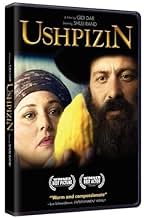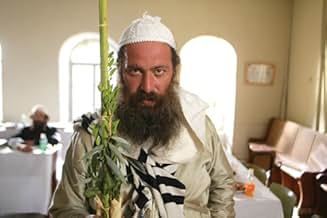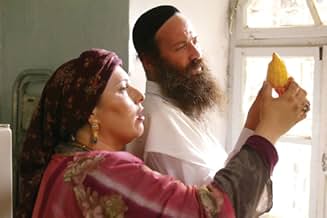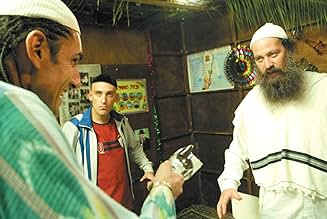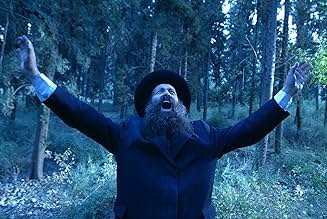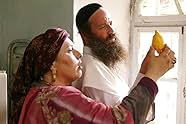AVALIAÇÃO DA IMDb
7,3/10
2,2 mil
SUA AVALIAÇÃO
Adicionar um enredo no seu idiomaAn Orthodox Jewish couple's faith is tested after praying to the Lord for a child on the Succoth holiday.An Orthodox Jewish couple's faith is tested after praying to the Lord for a child on the Succoth holiday.An Orthodox Jewish couple's faith is tested after praying to the Lord for a child on the Succoth holiday.
- Prêmios
- 1 vitória e 4 indicações no total
Daniel Dayan
- The Rabbi
- (as Rabbi Daniel Dayan)
Michael Weigel
- Ethrog Assessor
- (as Michael Vaigel)
Avaliações em destaque
This was a delightful movie in so many ways.
First, I really enjoyed the overall depiction of what was for me a very different cultural setting ... both regarding the religious context (Ultra-Orthodox Judaism) and the geocultural context (contemporary Israel, especially contemporary Jerusalem). I certainly can't comment on authenticity; but the overall flavor was convincing and the often exotic (to me) happenings, sayings, behaviors, etc were to me very appealing.
Second, the characters of Moshe and Malli were simply wonderful and wonderfully appealing. Their relationship was vivid; and the window into how an Orthodox marriage relationship "works" in the context of a strong Faith commitment by both of the couple was such a bracing experience for me.
Third, the general plot-theme ... two escaped convicts showing up and both challenging and straining Hospitality ... is very appealing to me. The characters of the convicts ... Scorpio and Yossef ... were much less appealing but certainly (uh) interesting.
Still the odd relationship between Moshe and Scorpio; and between Moshe and his wife and Scorpio and Yossef ... somehow lacked something that for me I could really find very convincing. The behavior of Scorpio and Yossef toward both their hosts, and to the general religious community on the street in which they were staying, was so attention-provoking that I had to ask myself what kind of escaped convicts want that kind of attention.
Yet all in all I really enjoyed this movie. And if you, like me, find this a pleasing but somewhat mystifying *cultural* challenge, hey, read some of the other comments on IMDb, there are some wonderful comments from Israel in particular that have shed much light for me.
First, I really enjoyed the overall depiction of what was for me a very different cultural setting ... both regarding the religious context (Ultra-Orthodox Judaism) and the geocultural context (contemporary Israel, especially contemporary Jerusalem). I certainly can't comment on authenticity; but the overall flavor was convincing and the often exotic (to me) happenings, sayings, behaviors, etc were to me very appealing.
Second, the characters of Moshe and Malli were simply wonderful and wonderfully appealing. Their relationship was vivid; and the window into how an Orthodox marriage relationship "works" in the context of a strong Faith commitment by both of the couple was such a bracing experience for me.
Third, the general plot-theme ... two escaped convicts showing up and both challenging and straining Hospitality ... is very appealing to me. The characters of the convicts ... Scorpio and Yossef ... were much less appealing but certainly (uh) interesting.
Still the odd relationship between Moshe and Scorpio; and between Moshe and his wife and Scorpio and Yossef ... somehow lacked something that for me I could really find very convincing. The behavior of Scorpio and Yossef toward both their hosts, and to the general religious community on the street in which they were staying, was so attention-provoking that I had to ask myself what kind of escaped convicts want that kind of attention.
Yet all in all I really enjoyed this movie. And if you, like me, find this a pleasing but somewhat mystifying *cultural* challenge, hey, read some of the other comments on IMDb, there are some wonderful comments from Israel in particular that have shed much light for me.
Positive depictions of haredi (so-called-ultra-Orthodox) lifestyle in film, whether American or Israeli, are not common. "Ushpizin" is a delightful little tale, almost a fable, with quite a bit of hidden depth.
Newly religious Moshe and Mali (real-life couple Shuli and Michal Bat-Sheva Rand) desperately need a miracle to get through the holiday of Sukkot. Without any support from Moshe's yeshiva, they are about to be overwhelmed by back rent and other debts. Strict believers in the Breslov tradition, they pray for a miracle, even as it unfolds (a brilliant 3-way inter-cut sequence that is the highlight of the film). Their joy is short-lived, however, when Elihayu and Yosef, unexpected guests from Moshe's pre-Haredi life, join them for the holiday.
The film is surprisingly honest -- Moshe and Mali are placed in the uncomfortable position of practicing genuine hospitality and tolerance to those who attitudes and actions place them diametrically opposed to everything the haredi couple stand for. Indeed, when Eliyahu and Yosef blast their music in the middle of the haredi neighborhood, a lynch mob nearly forms, the isolationist side of Haredi life raising its ugly head to keep its own courtyards clean of the outside world. There is a certain sense in the movie that Breslov chasidim distinguish themselves from the other sects in truly practicing love and outreach, coupled with unshakable belief.
Shuli Rand's portrayal of Moshe, which is probably more than a bit autobiographical, is dead-on: conflicted and uncomfortably reminded of a world he left far behind. The film makes a strong case for Divine Providence in every aspect of every individual's life, and for living up to the challenges and tests that G-d places before you.
Newly religious Moshe and Mali (real-life couple Shuli and Michal Bat-Sheva Rand) desperately need a miracle to get through the holiday of Sukkot. Without any support from Moshe's yeshiva, they are about to be overwhelmed by back rent and other debts. Strict believers in the Breslov tradition, they pray for a miracle, even as it unfolds (a brilliant 3-way inter-cut sequence that is the highlight of the film). Their joy is short-lived, however, when Elihayu and Yosef, unexpected guests from Moshe's pre-Haredi life, join them for the holiday.
The film is surprisingly honest -- Moshe and Mali are placed in the uncomfortable position of practicing genuine hospitality and tolerance to those who attitudes and actions place them diametrically opposed to everything the haredi couple stand for. Indeed, when Eliyahu and Yosef blast their music in the middle of the haredi neighborhood, a lynch mob nearly forms, the isolationist side of Haredi life raising its ugly head to keep its own courtyards clean of the outside world. There is a certain sense in the movie that Breslov chasidim distinguish themselves from the other sects in truly practicing love and outreach, coupled with unshakable belief.
Shuli Rand's portrayal of Moshe, which is probably more than a bit autobiographical, is dead-on: conflicted and uncomfortably reminded of a world he left far behind. The film makes a strong case for Divine Providence in every aspect of every individual's life, and for living up to the challenges and tests that G-d places before you.
It's quite hard for me to speak about this film without referring to the context of the delicate balance of relations between religious and non-religious people in Israel. This film is made mostly by religious people, and the whole story is told from the perspective of the deep believers. Jewish religious Jerusalem looks beautiful in this film, and it's no better moment to put it on screen than the festival of Succot. Still, the world and life of the religious people in Israel is much more complicated, and the problems they face are quite different, but this is not what this story is about.
What this is indeed about is about what does influence our lives. The main characters are a born-again Jew and his wife, living at the brink of their resources a life of devotion and religious studies. Many things happen to them in the few days before and during the holiday, and these can be explained as miracles dictated by God, or by circumstances of hazard. Of course, the characters are true believers, they speak to God, and know that God rewards them or punishes them for their deeds, but is not this the result of their imagination derived from their deep belief? The director makes for most of the film no comment and lets the viewers decide by themselves. Only by the end, in the last minutes he decides to become explicit, and this is a mistake in my opinion. The kind of Hollywood style ending adopted by this film is sometimes called 'Deus ex machina' and never was the name more appropriate.
Acting is wonderful, both of the religious people looking like characters descending directly from Bashevis Singer's books, as well as the non-religious ones, although their characters are closer to stereotypes. The film was originally made for TV, I believe, with a small budget, it still is true and sincere and funny in many moments. I am looking forward to see how it will be received by the North American audiences.
What this is indeed about is about what does influence our lives. The main characters are a born-again Jew and his wife, living at the brink of their resources a life of devotion and religious studies. Many things happen to them in the few days before and during the holiday, and these can be explained as miracles dictated by God, or by circumstances of hazard. Of course, the characters are true believers, they speak to God, and know that God rewards them or punishes them for their deeds, but is not this the result of their imagination derived from their deep belief? The director makes for most of the film no comment and lets the viewers decide by themselves. Only by the end, in the last minutes he decides to become explicit, and this is a mistake in my opinion. The kind of Hollywood style ending adopted by this film is sometimes called 'Deus ex machina' and never was the name more appropriate.
Acting is wonderful, both of the religious people looking like characters descending directly from Bashevis Singer's books, as well as the non-religious ones, although their characters are closer to stereotypes. The film was originally made for TV, I believe, with a small budget, it still is true and sincere and funny in many moments. I am looking forward to see how it will be received by the North American audiences.
"Sad to be all alone in the world" WIthout children there is no laughter.... so starts the struggle of a Baal Tshuvah (returnees to Judaisn) family in Israel in the huge Breslower chassidic community. Moshe Balanga is struggling to put food on the table, although it is never explained WHY he doesn't work, he comes home dejected on the eve of the holiday of Sucot only to be told by his wife that his faith is lacking and that he should pray harder. Ushpizen is a look at the guarded frum (religious) community from the inside. No compromises of nudity, sex, violence, foul language are needed to tell this sweet, fast paced, emotional story. I saw it with a mostly Jewish audience, but sat next to a non jew who enjoyed it as much as I did. For all ages, for all walks of life.... You will cry, and you will laugh, and you will cheer when it is over. I can't wait to see it again, I suggest you run to see it when it hits national release in September.
Ushpizin is about a "chozer b'tshuva" (recently religious) Jerusalem couple whose faith is tested repeatedly during the Succot holiday. Will their faith hold as the tests get harder and harder? Will G-d send them the miracles they need? Familiar references spring to mind, from the biblical story of Avraham and Sarah, to traditional tales of shtetl life, to the stories of S.Y. Agnon. Yet the contemporary context makes it a highly original work. The film manages to retain and build dramatic tension. It successfully portrays strong emotions including anger, frustration, love, gratitude, and faith without becoming overly sentimental.
The main couple is played by actors who are married in real life and also religious in real life (he wrote the script). Their love, clearly visible, is one of the nicest parts of the story.
The criminals who come to stay as guests during the holiday ("Ushpizin" in Hebrew) are a bit too cartooned at times, but are not all bad.
It's nice to see a Jerusalem that really exists: a place of material poverty but spiritual wealth, home to an imperfect but caring community that finds meaning in the fulfillment of mitzvahs (commandments).
The main couple is played by actors who are married in real life and also religious in real life (he wrote the script). Their love, clearly visible, is one of the nicest parts of the story.
The criminals who come to stay as guests during the holiday ("Ushpizin" in Hebrew) are a bit too cartooned at times, but are not all bad.
It's nice to see a Jerusalem that really exists: a place of material poverty but spiritual wealth, home to an imperfect but caring community that finds meaning in the fulfillment of mitzvahs (commandments).
Você sabia?
- CuriosidadesShuli Rand had two conditions for making this movie, both were met. The first was that his real-life wife, Michal Bat-Sheva Rand, would play his wife in the film. The second is that in Israel the film would not be screened on the Jewish Sabbath.
- Citações
[from trailer]
Narrator: They worked out of luck, out of hope. And faith was all they had to hang on to. But on this holy week, where guests are considered a blessing, these two unexpected visitors bring with them: a secret from the past. A secret that would test their love and challenge their faith. Now only a miracle will turn their fortune around.
- ConexõesFeatured in Sharon Amrani: Remember His Name (2010)
Principais escolhas
Faça login para avaliar e ver a lista de recomendações personalizadas
Detalhes
- Data de lançamento
- País de origem
- Central de atendimento oficial
- Idiomas
- Também conhecido como
- Visitantes
- Locações de filme
- Empresa de produção
- Consulte mais créditos da empresa na IMDbPro
Bilheteria
- Faturamento bruto nos EUA e Canadá
- US$ 1.400.666
- Fim de semana de estreia nos EUA e Canadá
- US$ 64.423
- 23 de out. de 2005
- Faturamento bruto mundial
- US$ 1.565.016
Contribua para esta página
Sugerir uma alteração ou adicionar conteúdo ausente





